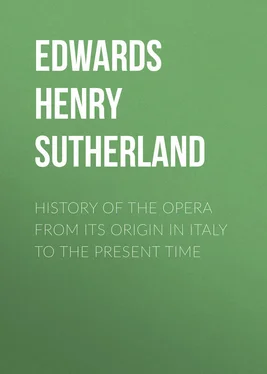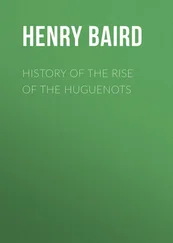Henry Edwards - History of the Opera from its Origin in Italy to the present Time
Здесь есть возможность читать онлайн «Henry Edwards - History of the Opera from its Origin in Italy to the present Time» — ознакомительный отрывок электронной книги совершенно бесплатно, а после прочтения отрывка купить полную версию. В некоторых случаях можно слушать аудио, скачать через торрент в формате fb2 и присутствует краткое содержание. Жанр: foreign_home, music_dancing, foreign_antique, foreign_prose, на английском языке. Описание произведения, (предисловие) а так же отзывы посетителей доступны на портале библиотеки ЛибКат.
- Название:History of the Opera from its Origin in Italy to the present Time
- Автор:
- Жанр:
- Год:неизвестен
- ISBN:нет данных
- Рейтинг книги:4 / 5. Голосов: 1
-
Избранное:Добавить в избранное
- Отзывы:
-
Ваша оценка:
- 80
- 1
- 2
- 3
- 4
- 5
History of the Opera from its Origin in Italy to the present Time: краткое содержание, описание и аннотация
Предлагаем к чтению аннотацию, описание, краткое содержание или предисловие (зависит от того, что написал сам автор книги «History of the Opera from its Origin in Italy to the present Time»). Если вы не нашли необходимую информацию о книге — напишите в комментариях, мы постараемся отыскать её.
History of the Opera from its Origin in Italy to the present Time — читать онлайн ознакомительный отрывок
Ниже представлен текст книги, разбитый по страницам. Система сохранения места последней прочитанной страницы, позволяет с удобством читать онлайн бесплатно книгу «History of the Opera from its Origin in Italy to the present Time», без необходимости каждый раз заново искать на чём Вы остановились. Поставьте закладку, и сможете в любой момент перейти на страницу, на которой закончили чтение.
Интервал:
Закладка:
"Among Lord Peterborough's papers, she found his memoirs, written by himself, in which he declared he had been guilty of such actions as would have reflected very much upon his character, for which reason she burnt them. This, however, contributed to complete the excellency of her principles, though it did not fail giving offence to the curious inquirers after anecdotes of so remarkable a character as that of the Earl of Peterborough."
The deserved good fortune of Anastasia Robinson reminds me of the careers of two other vocalists of this period, one of them owed her elevation to a fortunate accident; while the third, though she entered upon the same possible road to the peerage as the second, yet never attained it. "The Duke of Bolton," says Swift, in one of his letters, "has run away with Polly Peachum, having settled four hundred a year on her during pleasure, and upon disagreement, two hundred more." This was the charming Lavinia Fenton, the original Polly of the Beggars' Opera, between whom and the Duke the disagreement anticipated by the amiable Swift never took place. Twenty-three years after the elopement, the Duke's wife died, and Lavinia then became the Duchess of Bolton. She was, according to the account given of her by Dr. Joseph Warton, "a very accomplished and most agreeable companion; had much wit, good strong sense, and a just taste in polite literature.
Her person was agreeable and well made," continues Dr. Warton, "though I think she never could be called a beauty. I have had the pleasure of being at table with her, when her conversation was much admired by the first character of the age, particularly by old Lord Bathurst and Lord Granville."
The beautiful Miss Campion, who was singing about the same time as Mrs. Tofts, and who died in 1706, when she was only eighteen, did not become the Duchess of Devonshire; but the heart-broken old Duke, who appears to have been most fervently attached to her, buried her in his family vault in the church of Latimers, Buckinghamshire, and placed a Latin inscription on her monument, testifying that she was wise beyond her years, and bountiful to the poor even beyond her abilities; and at the theatre, where she had some times acted, modest and pure; but being seized with a hectic fever, she had submitted to her fate with a firm confidence and Christian piety; and that William, Duke of Devonshire, had, upon her beloved remains, erected this tomb as sacred to her memory.
CHAPTER VI.
THE ITALIAN OPERA UNDER HANDEL
Handel at Hamburgh. – Handel in London. – The Queen's Theatre. – The Royal Academy of Music. – Operatic Feuds. – Porpora and the Nobility's Opera.
THE great dates of Handel's career as an operatic composer and director are: —
1711, when he produced Rinaldo , his first opera, at the Queen's Theatre, in the Haymarket;
1720, when the Royal Academy of Music was established under his management at the same theatre, (which, with the accession of George I., had become "the King's");
1734, when in commencing the season at the King's Theatre with a new company, he had to contend against the "Nobility's Opera" just opened at the Theatre in Lincoln's Inn Fields, under the direction of Porpora;
1735, when he moved to Covent Garden, Porpora and "la nobilita Britannica" going at the same time to the King's Theatre.
Both operas failed in 1737, and Handel then went back to the King's Theatre, for which he wrote his last opera Deidamia in 1740.
Of Handel's arrival in England, and of the manner in which his first opera was received, I have spoken in the preceding chapter. Of his previous life in Germany but little is recorded; indeed, he left that country at the age of twenty-five. It is known, however, that he was for some time engaged at the Hamburgh theatre, where operas had been performed in the German language since 1678. Rinuccini's Dafne , set to music by Schutz, was represented, as has been already mentioned, at Dresden in 1627, (or according to other accounts 1630); but this was a private affair in honour of a court marriage, and the first opera produced in Germany in public, and in the German language, was Thiele's Adam and Eve , which was given at Hamburgh in 1678. The reputation of Keiser at the court of Wolfenbüttel caused the directors of the Hamburgh Theatre, towards the close of the century, to send and offer him an engagement; he accepted it, and in the course of twenty-seven years produced as many as one hundred and sixty operas. Mattheson states that both Handel and Hasse (who was afterwards director of the celebrated Dresden Opera) formed their styles on that of Keiser. 20 20 It is also known that both profited by the study of Scarlatti's works.
Mattheson, himself a composer, succeeded Keiser as conductor of the orchestra at the Hamburgh Theatre, holding that post, however, conjointly with Handel, whose quarrel and duel with Mattheson have often been related. Handel was presiding in the orchestra while Mattheson was on the stage performing in an opera of his own composition. The opera being concluded, Mattheson proposed to take Handel's place at the harpsichord, which the latter refused to give up. The rival conductors quarrelled as they were leaving the theatre. The quarrel led to a blow and the blow to a fight with swords in the market place, which was terminated by Mattheson breaking the point of his sword on one of his antagonist's buttons, or as others have it, on the score of his own opera, which Handel carried beneath his coat.
Handel went from Hamburgh to Hanover, where, as we have seen, he received an invitation from some English noblemen to visit London, and, with the permission and encouragement of the Elector, accepted it.
Handel's Rinaldo was followed at the King's Theatre by his Il Pastor Fido (1712), his Teseo (1713), and his Amadigi (1715). Soon after the production of Amadigi , the performances at the King's Theatre seem to have ceased until 1720, when the "Royal Academy of Music" was formed. This so-called "Academy" was the result of a project to establish a permanent Italian opera in London. It was supported by a number of the nobility, with George I. at their head, and a fund of £50,000 was raised among the subscribers, to which the king contributed £1,000. The management of the "Academy" was entrusted to a governor, a deputy governor, and twenty directors, (why not to a head master and assistants?) and for the first year the Duke of Newcastle was appointed governor; Lord Bingley, deputy governor; while among the directors were the Dukes of Portland and Queensberry, the Earls of Burlington, Stair and Waldegrave, Lords Chetwynd and Stanhope, Sir John Vanburgh, (architect of the theatre), Generals Dormer, Wade, and Hunter, &c. The worse than unmeaning title given to the new opera was of course imitated from the French; the governor, deputy governor, and directors being doubtless unacquainted with the circumstances under which the French Opera received the misnomer which it still retains. 21 21 See Chapter II.
They might have known, however, that the "Académie Royale" of Paris, at that time under the direction of Rameau, was held in very little esteem, except by the French themselves, as an operatic theatre, and moreover, that Italian music was never performed there at all. Indeed, for half a century afterwards, the French execrated Italian music and would not listen to Italian singers – which gives us some notion of what musical taste in France must have been at the time of our Royal Academy being founded. The title would have been absurd even if the French Opera had been the finest in Europe; as it was nothing of the kind, and as it was, moreover, sworn to its own native psalmody, to give such a title to an Italian theatre, supported by musicians and singers of the greatest excellence, was a triple absurdity. Strangely enough, even in the present day, the Americans, as ingenious as the English of George I.'s reign, call their magnificent Italian Opera House at New York the Academy of Music. As a matter of association, it would be far more reasonable to call it the "St. Charles's Theatre," or the "Scale Theatre."
Интервал:
Закладка:
Похожие книги на «History of the Opera from its Origin in Italy to the present Time»
Представляем Вашему вниманию похожие книги на «History of the Opera from its Origin in Italy to the present Time» списком для выбора. Мы отобрали схожую по названию и смыслу литературу в надежде предоставить читателям больше вариантов отыскать новые, интересные, ещё непрочитанные произведения.
Обсуждение, отзывы о книге «History of the Opera from its Origin in Italy to the present Time» и просто собственные мнения читателей. Оставьте ваши комментарии, напишите, что Вы думаете о произведении, его смысле или главных героях. Укажите что конкретно понравилось, а что нет, и почему Вы так считаете.












